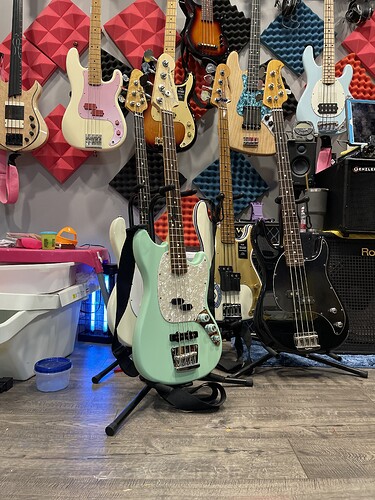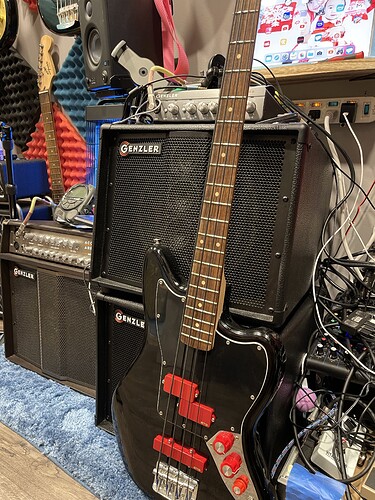Hi All,
Still a fledgling bass player and still muddling through my lessons after far too long, but have none the less created justification and empathy with my wife to get the green light on buying a new bass.
I’m looking for experienced conjecture, opinions and advice and am ok with snark and fun ![]()
When I started playing I started with Squire Classic Vibe 60s P bass and Ampeg RB115.
After a few months I invested in a proper setup but also decided to add the Steve Harris signature pickups and strings. Tech at GC did a great job and aside from being much lighter it has an amazing sound…but only for Maiden and other similar type of metal.
What I learned is that those strings are super heavy and makes it really hard to play anything needing heavier bends or similar. It’s great for the aggressive attack though and great budget version of the signature.
Then left fret hand carpel tunnel set in (old Air Force injury from loading missiles for 8 years) and I was limited to about 15 mins playing before hand would go numb or aching.
After some PT on it for a couple months I was ready to play again but it was still an issue so I used that as justification to purchase a short scale bass…a Squire Paranormal Rascal.
I’ve really enjoyed playing it and love the 60’s vibe and sound it puts out but the bridge is mounted really high up on the body so the even though the fretboard is short scale it’s as long as my 34" P bass and the muscle memory of my mostly my right hand is throwing me. I still play my knock off Steve Harris Squire but when I switch back it’s a struggle.
So now, I’ve gotten better at playing but again feel limited between the two and their setups. Looking back I should have just stopped on the P bass with setup and new strings and that would be a more versatile bass for me.
So thanks for reading all that…Here’s where my heads at now.
I really like the jazz neck on the PJ basses. Love the idea of the bridge pickup and added tones and so I’ve been eyeballing the Lakland Skyline Geezer Butler basses. The new version hits stores in about 3 weeks.
Fender has a decent sale going on now as well on their Player and American 2 basses but their PJ basses have the standard 1.62" nut width.
I don’t play with anyone else beside my grandson on occasion so it’s mostly me banging away with bourbon after work to relieve stress or before bed.
I play, try to play/learn, mostly 60s -70s classic rock and 80s metal but have been trying to learn more R&B as well.
Looked and toyed with the idea of a Ricks too and especially would love to bump the budget and find a Al Cisneros Signature Rick cause it’s cool as hell. But I’ve never played one and feel like that may be another niche limited use for me bass…or maybe not?
FWIW my son (31) plays guitar and thinks I should invest in a better amp over a new bass.
Budgeting $2000
Sorry this is so damn long…but if I’m looking for guidance or a sounding board, I figure the details matter ![]()

